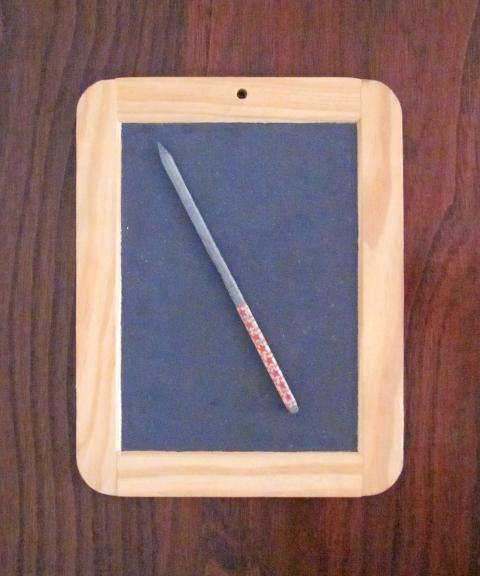Chinese Practice
洗心革面(xi3 xin1 ge2 mian4)
to cleanse one’s mind and change one’s behavior

Photo: Wikimedia Commons
照片:維基共享資源
《易經》是一部古中國占卜書,以六十四卦組成一系統。《十翼》是後世為了解釋《易經》所作的《易傳》之一。《十翼》中的第五及第六翼,也就是被稱為〈繫辭傳〉的上下兩篇,據傳為孔子所作,雖然此說存疑。〈繫辭上〉記載,子曰(「子」或許指的是孔子),「聖人以此洗心,退藏於密」(聖人用它來淨化自己的心靈,退隱藏身,不使人知,以存養才能),這是在談論占卜過程和卦所帶來的好處;換句話說,它可以讓人具有洞察力,不受自己主觀意志的影響。
《易經》〈革卦〉中寫道,「君子豹變,小人革面」,意思是說,君子的改變如同豹的毛紋變得更斑斕絢麗,是真正的遷善去惡、美德顯現;而小人的改變,只不過是改變面目來巴結君王。「革面」的意思是改變其外在行為,再加上前面所說的「洗心」,即為成語「洗心革面」,字面上的意義是把心洗淨、把臉更新,也就是英語所說的「to turn over a new leaf」。
在十六世紀的英國,書的頁面被稱為「leaves」;現在我們仍用「leafing through」這樣的說法來指翻頁瀏覽一本書的大致內容。「To turn over a new leaf」意指在寫作中的書冊新起一頁:以此頁總結前文,或重新開始,或新起頭。此語用法跟「start with a clean slate」很類似。在英國維多利亞女王時代,學生在鑲木框的石板(slate)上書寫,因為如果寫錯了,或要開始新的一課,就可以把它擦乾淨。石板也用於雜貨店和酒館,以記錄客人尚未付清的食品或飲料帳款。等到客人付了帳,老闆就會把他的石板擦乾淨,他就不再欠錢,可以重新開始。如今我們雖早已不用石板寫字記帳,這個比喻的說法仍留傳了下來。
因此,「to turn over a new leaf」就和「to start with a clean slate」一樣,都指重新開始,不受過去的行為或過失所束縛。
(台北時報編譯林俐凱譯)
經過了這些年他終於出獄,總算能夠洗心革面、重新做人了。
(Finally, after all these years, he’s out of jail. He’s going to turn a new leaf, a changed man.)
英文練習
to turn over a new leaf;
start with a clean slate
The Book of Changes (Yijing) is an ancient Chinese divinatory text employing 64 symbolic hexagrams. Over time, the Ten Wings, a set of commentaries, were added. The fifth and sixth “wings” are known as the Great Treatise parts I and II and have been attributed to Confucius, although this attribution has been questioned. In the Great Treatise part I, “the master” — Confucius? — talks of the contribution of the divination process and the hexagrams, that they allow sages to “cleanse their minds [洗心], retire and lay them up in the secrecy (of their own consciousness)”: in other words, to allow them to see with perspicacity unimpeded by their own subjectivity.
In the section on the hexagram ge (change) of the Book of Changes, it says, “the superior man produces his changes as the leopard (does when it) changes (its spots), while the inferior man changes his face (and shows his obedience).” Here, 「革面」 means to adjust one’s behavior. Together with the 洗心 (to cleanse the mind) of the previous reference, we get the idiom 洗心革面: Literally, to cleanse one’s mind and change one’s appearance; more idiomatically, “to turn over a new leaf.”
Back in 16th century England, the pages of a book were referred to as leaves; we still talk of “leafing” through a book when we are turning the pages to ascertain the general nature of its contents. The phrase “to turn over a new leaf” means to commence a new page in a book one is writing: to conclude that which went before, to begin anew, to make a fresh start. In use, it is very similar to “start with a clean slate.” In Victorian times, students would write on pieces of slate in a wooden frame, as it could be wiped clean if they made a mistake or needed to start a new lesson. Slates, too, were used in grocery stores and public houses to record the value of food or drink a customer had not yet paid for. When they did pay their bill, the store owner — or publican — would wipe their slate clean, and they could start anew, free of their accrued debt. The figurative term has long survived the outdated practice.
To “turn over a new leaf,” then, as with “to start with a clean slate,” means starting again unencumbered by your past actions or transgressions.(Paul Cooper, Taipei Times)
He has apologized, and I have accepted his apology. We’re going to wipe the slate clean and start again.
(他已經跟我道歉,我也接受了。所以我們會盡釋前嫌。)

A: In addition to “Mission: Impossible 8,” what other new movies are in theaters? B: “Final Destination: Bloodlines” and “The Wedding Banquet” are out. The French film “Jane Austen Wrecked My Life” will also open soon. A: The Final Destination horror movie series is so scary that I don’t dare watch it. B: Then how about “The Wedding Banquet,” which is a 2025 remake of the 1993 classic of the same title? Oscar-winning actress Youn Yuh-jung’s performance in it is highly anticipated. A: But as a fan of British writer Jane Austen, I’m more interested to see how her works

US President Donald Trump on Monday last week signed the TAKE IT DOWN ACT (Tools to Address Known Exploitation by Immobilizing Technological Deepfakes on Websites and Networks Act), bipartisan legislation that enacts stricter penalties for the distribution of non-consensual intimate imagery, sometimes called “revenge porn,” as well as deepfakes created by artificial intelligence. The measure, which goes into effect immediately, was introduced by Sen. Ted Cruz, a Republican from Texas, and Sen. Amy Klobuchar, a Democrat from Minnesota, and later gained the support of First Lady Melania Trump. Critics of the measure, which addresses both real and artificial intelligence-generated imagery, say

Cats ruled in ancient Egypt—and not just in their own minds. These clever, graceful creatures were so deeply respected by the Egyptians that harming one could lead to severe punishment, even death. But why did the Egyptians hold cats in such high regard? It wasn’t just because they were cute; cats played a crucial role in protecting the country’s grain stores from pests. As guardians of Egypt’s food supply, they were seen as sacred animals. The Egyptians honored them through Bastet, the cat-headed goddess of protection, the home and fertility. Egyptians didn’t just love cats; they worshipped them. Cats lived in luxury,

A: Wanna go see a movie during the three-day weekend for the Dragon Boat Festival? B: Sure, I wanna see “Mission: Impossible – The Final Reckoning.” A: Rumor has it that this may be actor Tom Cruise’s last mission with the Mission: Impossible action movie franchise. B: Tom was only 34 when the first installment of the series was released in 1996. Now, he’s 63 and the eighth installment is out. A: I hope he’ll stay with the series. Let’s go see him fight against AI this weekend. A: 端午節三天連假週末要不要去看電影? B: 好啊我想看 《不可能的任務:最終清算》! A: 這有可能是湯姆克魯斯最後一次為動作片《不可能》系列出任務。 B: